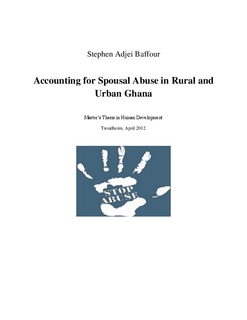| dc.contributor.advisor | Johannesen, Berit | nb_NO |
| dc.contributor.author | Baffour, Stephen Adjei | nb_NO |
| dc.date.accessioned | 2014-12-19T14:42:24Z | |
| dc.date.available | 2014-12-19T14:42:24Z | |
| dc.date.created | 2012-06-19 | nb_NO |
| dc.date.issued | 2012 | nb_NO |
| dc.identifier | 535355 | nb_NO |
| dc.identifier.uri | http://hdl.handle.net/11250/270834 | |
| dc.description.abstract | The present study use data from a semi-structured qualitative interview and focus group discussions to explore the psychosocial, structural and cultural influences of the phenomenon of spousal abuse in rural and urban areas of Ghana. The study also sought to examine, in-depth, the impact of social and economic power differentials on spousal abuse. Using qualitative discourse analysis, results showed three fundamental themes as accounting for spousal abuse: economic and social power dynamics, traditional and institutionalized practices and religious and social influences. Respondents associated men‘s status and power in marriage to their economic responsibilities. Men‘s loss of self-worth and identity as a result of their lack of economic resources to play their primary breadwinner role was seen to influence their violent behaviour in marriage in Ghana. Respondents also attributed the overlapping and conflicting identities of men and women in Ghana and the perception of masculinity and femininity to spousal abuse. Traditional and institutionalized practices such as bride price, traditional system of spousal conflict arbitration, privatization of abuse, weak social support and religiosity were discovered to influence abuse in marital relationships. However, the study did not find any systematic difference between rural and urban areas of Ghana in terms of the discourses on the phenomenon of spousal abuse. | nb_NO |
| dc.language | eng | nb_NO |
| dc.publisher | Norges teknisk-naturvitenskapelige universitet, Fakultet for samfunnsvitenskap og teknologiledelse, Psykologisk institutt | nb_NO |
| dc.subject | Social and Behavioural Science, Law | en_GB |
| dc.title | Accounting for Spousal Abuse in Rural and Urban Ghana | nb_NO |
| dc.type | Master thesis | nb_NO |
| dc.source.pagenumber | 132 | nb_NO |
| dc.contributor.department | Norges teknisk-naturvitenskapelige universitet, Fakultet for samfunnsvitenskap og teknologiledelse, Psykologisk institutt | nb_NO |
